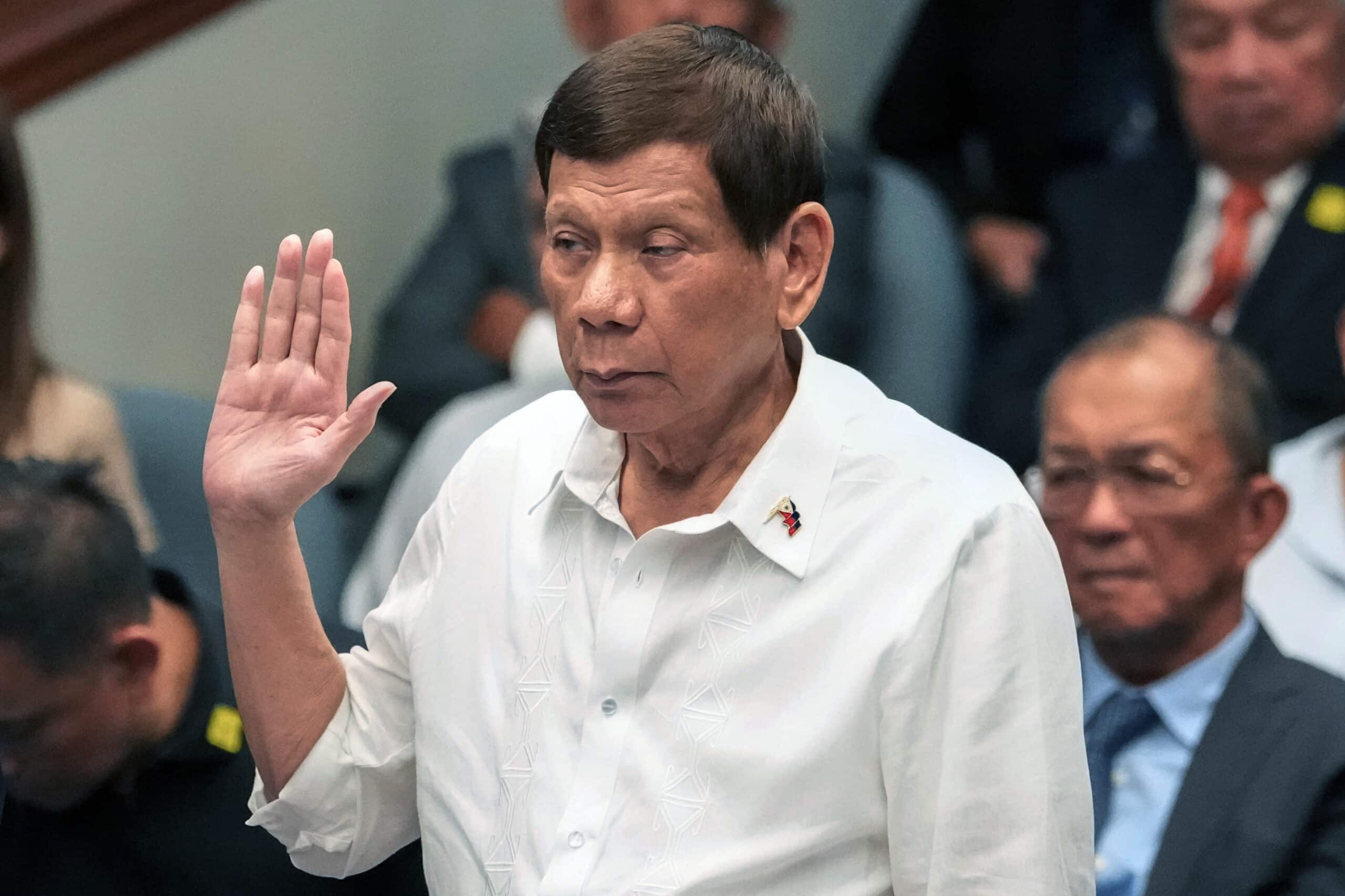Why the ICC arrest of former Pres. Rodrigo Duterte is illegal

FILE – Former Philippine President Rodrigo Duterte takes oath during a senate inquiry on the so-called war on drugs during his administration at the Philippine Senate, on Oct. 28, 2024, in Manila, Philippines. (AP Photo/Aaron Favila,File)
 The notion that the Philippines’ membership in Interpol compels it to arrest and surrender former President Rodrigo Duterte (PRRD) under an International Criminal Court (ICC) warrant is legally untenable.
The notion that the Philippines’ membership in Interpol compels it to arrest and surrender former President Rodrigo Duterte (PRRD) under an International Criminal Court (ICC) warrant is legally untenable.
This argument misinterprets the distinct legal frameworks of Interpol and the ICC while disregarding constitutional principles and state sovereignty.
ICC jurisdiction and the Philippines’ withdrawal from the Rome Statute
A fundamental legal principle is that treaty obligations do not extend beyond a state’s voluntary consent. The Rome Statute, which established the ICC, explicitly allows for withdrawal, and the Philippines formally exited in 2019.
No retroactive ICC jurisdiction
Article 127(2) of the Rome Statute states that a withdrawing state remains obligated to cooperate with investigations initiated before its withdrawal. However, this does not equate to an obligation to enforce arrest warrants issued after withdrawal. The Philippine Supreme Court has affirmed that post-withdrawal, the country is no longer bound by ICC directives, including arrest warrants.
No implementing law for ICC arrest warrants
Under the Philippine Constitution, international treaties require domestic enabling legislation for enforcement. The Philippines never enacted a law implementing the ICC’s authority. Without such a statute, any enforcement of an ICC warrant would be ultra vires—beyond the scope of legal authority—and unconstitutional.
Sovereignty and treaty withdrawal
International law recognizes a state’s sovereign right to withdraw from treaties. The Philippines’ withdrawal signifies a rejection of ICC jurisdiction, rendering any action under its framework illegitimate. To enforce an ICC warrant now would violate Philippine sovereignty and the fundamental principle that no international body can impose obligations beyond a state’s consent.
Interpol’s legal framework and its limits
Some argue that the Philippines’ long-standing Interpol membership justifies PRRD’s arrest. This claim, however, ignores key legal limitations:
Interpol does not have arrest powers
Interpol is not a law enforcement agency. It facilitates information-sharing among member states but lacks jurisdiction to issue or enforce arrest warrants. A Red Notice, often misunderstood as an arrest warrant, is merely a request for information on a wanted individual. It does not obligate member states to act, particularly in the absence of domestic laws enabling such action.
Interpol’s constitution prohibits political interference
Article 3 of Interpol’s constitution explicitly prohibits involvement in politically motivated cases. Given that the ICC case against PRRD stems from political controversies surrounding his administration’s war on drugs, Interpol’s legal framework does not impose a mandatory enforcement obligation.
Extradition and Mutual Legal Assistance Treaties (MLATs) are required
For an individual to be arrested and surrendered to a foreign body, there must be:
- A valid extradition treaty with the requesting entity (the ICC, in this case); or
- A mutual legal assistance treaty (MLAT) that explicitly mandates arrest and surrender.
The Philippines has no extradition treaty or MLAT with the ICC. Further, the Philippine Extradition Law (RA 7659) does not recognize ICC arrest warrants as valid without a domestic statute enabling their enforcement. Interpol cannot override this legal requirement.
The Supreme Court’s interpretation of treaty obligations
The Supreme Court has consistently ruled that treaty obligations do not become enforceable without domestic legislation. In Bayan Muna v. Romulo (G.R. No. 159618, February 1, 2011), the Court emphasized that international commitments must comply with the Constitution and domestic laws before they can be implemented.
By extension, Interpol membership does not supersede constitutional due process. Without an enabling law, Philippine authorities cannot legally execute an ICC-issued arrest warrant.
Conclusion: Arrest would be unlawful
The claim that PRRD’s arrest can be justified under Interpol is legally flawed. The ICC has no jurisdiction over the Philippines post-withdrawal, and Interpol lacks the authority to enforce arrest warrants. More importantly:
- There is no enabling law requiring Philippine authorities to comply with ICC arrest warrants.
- Interpol does not have enforcement powers, and its Constitution forbids political interference.
- The Philippines has no extradition treaty or MLAT with the ICC to justify arrest and surrender.
The arrest of PRRD based on an ICC warrant – whether under Interpol or any other framework – is an unconstitutional act that violates state sovereignty and due process under Philippine law.
Atty. Arnedo S. Valera is the executive director of the Global Migrant Heritage Foundation and managing attorney at Valera & Associates, a US immigration and anti-discrimination law firm for over 32 years. He holds a master’s degree in International Affairs and International Law and Human Rights from Columbia University and was trained at the International Institute of Human Rights in Strasbourg, France. He obtained his Bachelor of Laws from Ateneo de Manila University.

